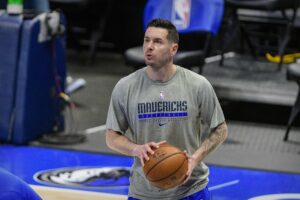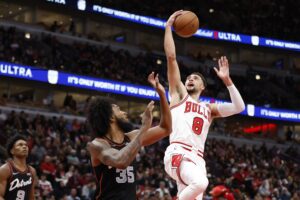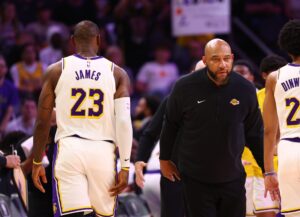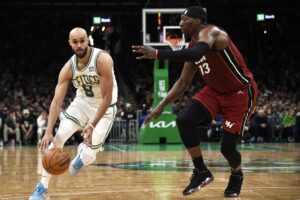After finishing a long and gritty seven-game series against the Oklahoma City Thunder, the Houston Rockets faced a new opportunity: upset the Los Angeles Lakers.
Once the Lakers knocked out the Portland Trailblazers in five games, they had under a week of preparation for the second round. The Rockets’ tough series indicated a sign of fatigue heading into the second round.
At first, the Rockets’ small-ball lineup paid off and took Game 1. However, the main highlight is the Lakers’ ability to switch and adjust to Houston’s game, especially against James Harden.
Series Recap: Los Angeles Lakers vs. Houston Rockets
Los Angeles Lakers’ Early Struggles
If one were to see the scenario where a restless team outperforms a rested one, it would raise some eyebrows since the long period’s purpose is to be as prepared for your next opponent as possible. At first, this appeared to be the case for the Lakers. During the postseason, Los Angeles was third in steals (8.3) and first in blocks (9.1) due to their large appearance on defense. Houston initially had the advantage because of their unique system.
Most NBA teams typically are passing or shooting heavy with some overload length and defense. The Rockets were difficult to adjust to because they play a small ball style who lives and dies by the three-pointer. They committed to this style after trading away Clint Capela in February to separate themselves from the other Western Conference team’s size advantage. Houston lead in three-point attempts during the postseason, averaging 46.8 threes per game while shooting at 36.2 percent (ninth in the league). On contrary, the Lakers were the bigger team with JaVale McGee, Dwight Howard, and Anthony Davis. The Lakers were not prepared and allowed Harden to score 36 points off 12-20 shooting, Russell Westbrook adding 24 off 10-24 from the field and Eric Gordon finishing with 23 points off 7-14 shooting.
Houston’s smaller lineup tired the Lakers’ big lineup and also excelled in second-chance opportunities due to boxing out, the lost art of basketball. Throwing Rajon Rondo for 25 minutes will hurt if he has not played since March, but later settled in.
More Adjustments = More Success
What truly came down to success was how each team was going to address their adjustments contrary to the previous game. After the Lakers dropped Game 1, the question regarding their next move raised some curiosity. Would the Lakers excel at small ball or stick with their typical bigger lineups?
Game 2 showed that small ball would give the Rockets some trouble, after sitting Howard and only giving McGee eight minutes due to his lack of speed to run to Houston’s shooters and closeout. Markieff Morris came off the bench as a power forward and later played in a center’s role when McGee and Howard were not on the court. Morris’s 16 points came off 6-8 shooting and 4-5 behind the arc to give the Lakers that edge over the Rockets, especially with Westbrook’s shooting woes. Game 3 ended in history, as LeBron James became the NBA’s all-time leader in playoff victories (162), surpassing Derek Fisher‘s 161 wins.
Historically, Mike D’Antoni does not typically make quick or sudden adjustments within his roster, especially with the small ball success. This meant that Lakers’ coach Frank Vogel had a difficult choice to make: continue with small ball or playing their style of play but limiting Howard’s and McGee’s minutes and pushing Davis to center. Games 4 and 5 showed the Lakers’ success in adjustments, primarily on defense, only limiting the Rockets’ firepower offense to under 102 points each (Game 4 – 102, Game 5 – 100).
Houston’s Final Chance of Hope
The Rockets showed hope in Game 4 as they chipped away the Lakers’ 23 point league midway through the fourth quarter. Houston’s 18-2 cut the Lakers’ lead to 7, with a score of 106-96. Westbrook and Harden combined for 46 points in Game 4 while Austin Rivers scored 14 points off the bench and Gordon added 19. The Lakers showcased their “rest periods” while up 23 points in the fourth quarter, which first appeared concerning, but quickly adjusted by feeding Davis down low to utilize his size advantage over Gordon. He scored an easy fadeaway shot to give the Lakers some breathing room with 1:47 left to go. Alex Caruso sealed the victory with a corner 3-point shot to increase the lead to 108-100.
Houston’s late-game success showed their ability to turn around a game despite a tough Lakers’ defense only allowing 41 points at halftime. The silver lining is showing the Lakers’ weakness of inconsistency in closing out games. Los Angeles bounced back in Game 5 and did not look back, despite the Rockets going on a 17-2 lead to get within a seven-point deficit. The Lakers entered the second half with a 62-51 lead. While the Rockets got within seven points again after a Westbrook drive at 2:08 in the third quarter, Los Angeles scored the next 15 points and did not look back, eliminating Houston with a final score of 119-96.
Top Performers
Overall, the Lakers’ defense is the MVP of the series. The First-Team All NBA duo of James and Davis played a huge part and became too much for the small ball Rockets to defend in a five-game series. However, possessing the ability to quickly adjust to a completely new system within a few days shows the Lakers’ versatility and chemistry within the roster. The Lakers’ coaching staff excelled with implementing these quick changes to stop a surging Rockets’ offense, highlighting everyone’s role on the team.
James showed that he is on a mission as he enters his 11th career conference finals appearance. He finished the series averaging 29.4 points, 10.4 rebounds, and 7.4 assists. Davis finished averaging 25.4 points, 12.4 rebounds, and 4.0 assists.
Houston’s best player is easily Harden as he finished the series averaging 29.4 points, 4.6 rebounds, and 7.2 assists while shooting 50 percent from the field and 37.8 percent behind the arc.
Up Next for the Los Angeles Lakers
The Lakers move on to the Western Conference for the first time since 2010. They will face a talented and hungry Denver Nuggets team, coming off two consecutive 3-1 comebacks. The Nuggets overcame a 3-1 lead to defeat the Utah Jazz in the first round and Los Angeles Clippers in the second. The Lakers finished the season series 3-1, but only one game was decided by nine points or more.
Game 1 of the Western Conference Finals will begin on Friday, September 18th at 6 P.M. PST.
Main Photo:
Embed from Getty Images






